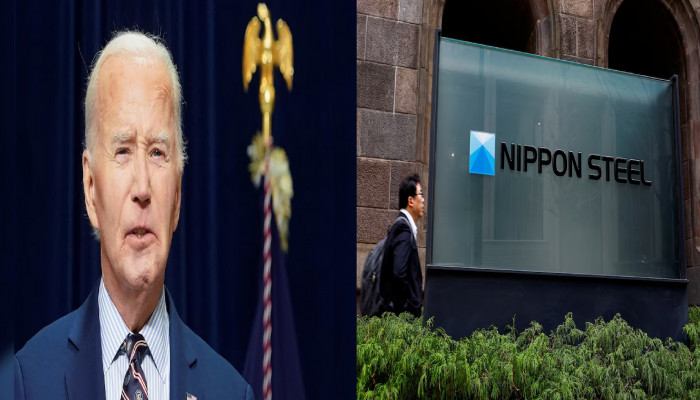US government rejects Nippon Steel's acquisition of US Steel citing national security concerns
- In Reports
- 07:55 PM, Jan 03, 2025
- Myind Staff
On Friday, US President Joe Biden delivered his pledge to thwart Nippon Steel's $14.9 billion offer to acquire US Steel, citing worries that the transaction may compromise national security.
The long-anticipated move ends a crucial source of funding for the struggling American company, which has stated that it would need to shut down important factories without the nearly $3 billion in promised investment from the Japanese firm. This also marks the conclusion of a major national security review led by the Committee on Foreign Investment in the United States (CFIUS). CFIUS is responsible for examining investments for any national security risks and had until Dec. 23 to approve, extend the review, or suggest that President Biden block the deal.
Since its announcement a year ago, the proposed partnership has encountered strong opposition in the United States. Biden and his incoming successor, Donald Trump, have both attacked it in an attempt to win over union voters in Pennsylvania, a swing state where US Steel is based. Both Biden and Trump argued that the business should continue to be controlled by Americans. The two companies tried to ease worries about the merger. Nippon offered to relocate its US headquarters to Pittsburg, where the US steelmaker is located and promised to respect all existing agreements between US Steel and USW. The merger seemed likely to be blocked quickly after the companies received a letter from CFIUS on August 31. The letter, which was seen by Reuters, stated that the deal could impact the supply of steel needed for important transportation, construction, and agriculture projects.
Nippon Steel argued that its investments, made by a company from a friendly nation, would actually boost US Steel's production. As a result, it received a 90-day extension for review. This extension gave the Committee on Foreign Investment in the United States (CFIUS) until after the November election to make a decision, leading supporters to hope that a less politically charged environment could help the deal's approval. However, those hopes were dashed in December when CFIUS, in a 29-page letter, set the stage for President Biden to block the deal by citing unresolved national security concerns, according to an exclusive report by Reuters.
According to a Reuters exclusive, Japanese Prime Minister Shigeru Ishiba pleaded with Biden to approve the merger in November in order to preserve recent attempts to deepen ties between the two nations. A spokesperson for Ishiba was unavailable for comment on Friday before Biden's statement. Japan is an important ally of the US in the Indo-Pacific, where China's growing economy and military power have raised concerns in Washington, along with threats from North Korea. Nearing its long-term objective of increasing capacity to 100 million tons, Nippon Steel has sought to increase its global output capacity from 65 million to 85 million metric tons annually. The USW union referred to US Steel's prior claims that the deal's failure would jeopardise thousands of jobs and cause it to close some steel facilities as "baseless threats and intimidation."







Comments